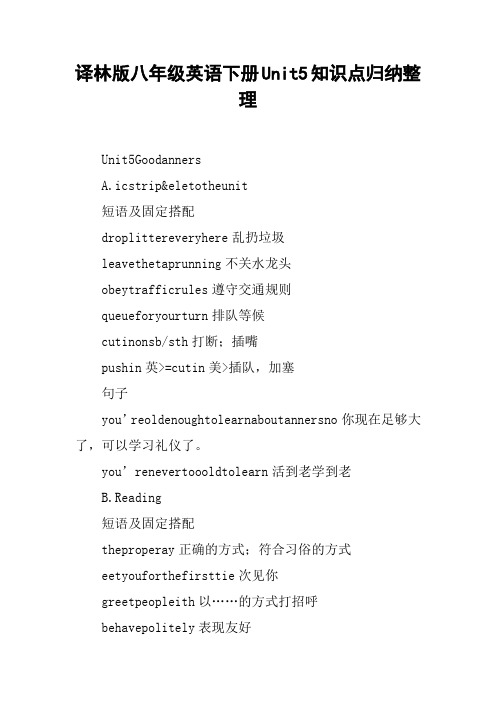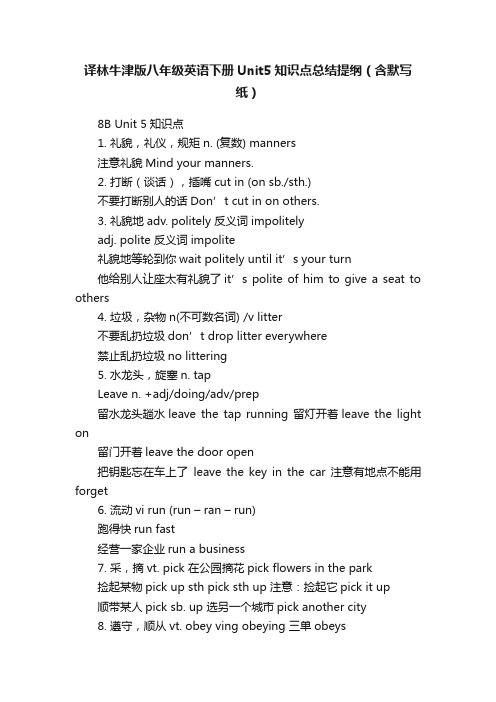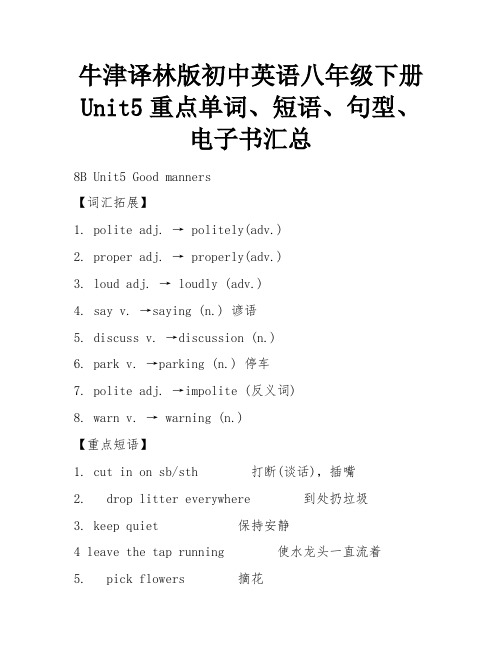牛津译林版八年级英语下册Unit 5 知识点总结梳理
Unit5单元知识点复习牛津译林版英语八年级下册

英语学科讲义You’re old enough to learn about manners now.➢manner 是可数名词,意思是:方式,态度,举止,礼貌,礼节,风俗,习俗;➢It’s good /bad manners to do sth.➢have manners 有礼貌,have no manners 没有礼貌➢…enough to do… 够…… 可以做……1.嘴里吃着东西说话是不礼貌的。
(翻译)答案:1.It’s bad manners to talk with a full mouth.2.enough strong to lift2、Don’t cut in on others. 不要打断别人。
1.cut in 插嘴, 打断老师上课时她爱插嘴。
She likes __________ ______while her teacher is giving a lesson.cut in on sb./sth. 打断某人谈话插嘴老人打断了他们的谈话。
The old man ______ _______ _______their conversation.别打断她。
让她继续发言。
_______ _______ ______ _______ her. Let her continue speaking.2.cut in = push in 插队,加塞她在列队的最前头插队。
She _______ _______at the head of the line. =She _______ _______at the head of the line.3.Othersothers是other的复数,相当于other 后接复数名词,意为“别的,其他的”。
the others表示一定范围内除去一部分以后其余的部分,特指已知的人或物中“除……之外,其余的全部”,相当于“the other+名词复数”。
译林版八年级英语下册Unit5知识点归纳整理

译林版八年级英语下册Unit5知识点归纳整理Unit5GoodannersA.icstrip&eletotheunit短语及固定搭配droplittereveryhere乱扔垃圾leavethetaprunning不关水龙头obeytrafficrules遵守交通规则queueforyourturn排队等候cutinonsb/sth打断;插嘴pushin英>=cutin美>插队,加塞句子you’reoldenoughtolearnaboutannersno你现在足够大了,可以学习礼仪了。
you’renevertoooldtolearn活到老学到老B.Reading短语及固定搭配theproperay正确的方式;符合习俗的方式eetyouforthefirsttie次见你greetpeopleith以……的方式打招呼behavepolitely表现友好invitesbtodosth邀请某人做某事shaesb’shand与某人握手avoidsth避免某事avoiddoingsth避免做某事句子heninRoe,doastheRoansdo入乡随俗c.Graaraenoughto的用法我们可以用该结构来描述一个人的品质和能力形容词结构:tobe+adjective+enough+todosthe.g.Heistallenoughtoreachthebaset他个子高,可以够到篮筐副词结构e.g.Hespoeslolyenoughforeveryonetounderstand他说得足够慢,每个人都能听懂名词结构e.g.Ihaveenoughcaestoeat我有足够多的蛋糕吃btoo…to的用法我们可以用该结构表达一种否定的结果基本结构:tobe+too+adjective+todosthe.g.I’tooeatogoanyfurther我太虚弱了,走不动了可以再不定时前+介词for引出逻辑主语e.g.Theboxistooheavyforthelittleboytocarry盒子太重了,这个小男孩搬不动当too…to结构含有否定词时,表示肯定意义e.g.oneisnevertoooldtolearn活到老,学到老当too后面加表示感情的时,表示肯定意义e.g.Heistoosadtohearthebadnes听到这个不幸的消息,他很悲伤。
译林牛津版八年级英语下册Unit5知识点总结提纲(含默写纸)

译林牛津版八年级英语下册Unit5知识点总结提纲(含默写纸)8B Unit 5知识点1. 礼貌,礼仪,规矩n. (复数) manners注意礼貌Mind your manners.2. 打断(谈话),插嘴cut in (on sb./sth.)不要打断别人的话Don’t cut in on others.3. 礼貌地adv. politely 反义词impolitelyadj. polite 反义词impolite礼貌地等轮到你wait politely until it’s your turn他给别人让座太有礼貌了it’s polite of him to give a seat to others4. 垃圾,杂物n(不可数名词) /v litter不要乱扔垃圾don’t drop litter everywhere禁止乱扔垃圾no littering5. 水龙头,旋塞n. tapLeave n. +adj/doing/adv/prep留水龙头趟水leave the tap running 留灯开着leave the light on留门开着leave the door open把钥匙忘在车上了leave the key in the car 注意有地点不能用forget6. 流动vi run (run – ran – run)跑得快run fast经营一家企业run a business7. 采,摘vt. pick 在公园摘花pick flowers in the park捡起某物pick up sth pick sth up 注意:捡起它pick it up顺带某人pick sb. up 选另一个城市pick another city8. 遵守,顺从vt. obey ving obeying 三单obeysobey- obeyed- obeyed 反义词disobey 顺从某人做某事obey sb. to do sth遵守交通规则obey traffic rules他顺从老师按时交作业He obeys the teacher to hand in homework on time9.(人、车等)排队等候queue n./vqueuing queued他正排队等车he is queuing for the bus 插队jump the queue10.(轮流的)顺序n. turn v. 变得;转向轮到你擦黑板了It’s your turn to clean the blackboard 轮流做某事take turns to do sth天变热了it’s turning hot 向某人求助turn to sb.打开(电器)turn on 关闭turn off 调高(声音)turn up 调低turn down11. 符合习俗的,正确的adj. proper adv. properly 反义词improperly正确和别人打招呼的方式the proper way to greet others the proper way of greeting others我们应当饮食适当we should eat and drink properly12. 问候,打招呼vt. greet Ving greeting相互问候greet each other英国人经常用亲吻和亲戚打招呼british people often greet relatives with a kiss13. 与某人握手shake sb’s hand Shake v/n = shaking shake- shook – shaken感到轻微的震动feel the slight shake/ shaking 摇摇头shake one’s head 晃动身体shake one’s body 14. 亲吻n./ v. kiss 复数kisses用亲吻互相问候greet each other with a kiss greet each other by kissing15. 亲密的;严密的adj. close- closer- closest v. 关闭close adj. 关着的closedadv. 靠近地close adv. 密切地closely商店星期天关门the shop is closed on Sundays.他是我最亲密的朋友he is my closest friend我住在学校附近I live near (to) my school. I live close to my school.密切地观察珍稀鸟类watch the rare birds closely16.(非正式)交谈,谈话n. conversation (可数)用有关天气的话题开始谈话start a conversation with the subjects about weather17. 避免vt. avoid避免某事avoid sth 避免做某事avoid doing sth请避免年龄体重之类的话题please avoid subjects like age or weight.避免在公共场合吸烟avoid smoking in public18. 话题,主题n. subject (可数)学科,科目你想选修哪门学科which subject would you choose to study?谈论音乐,书,或其他什么话题talk about subjects like music, books or something else.19. 表现vt/vi behave n. behavior (不可数)放规矩点behave yourself 表现礼貌behave politely 多么好的表现what good behavior 20. 民主,群众n / adj 公开的,公共的public公开地,在别人面前in public公众场所请勿大声喧哗don’t talk loudly in public/ in public places21. 推,挤push 插队,加塞push in/ cut in拉,拽pull 向岩石上攀爬pull oneself up插队到别人前面是粗鲁的It’s rude to push in before others他们不会碰到你,或从你旁边推挤过去they will not touch you or push past you.22. 撞,碰vi bump n. 保险杠bumper如果他们撞到某人,他们会说抱歉if they bump into someone, they will say sorry.撞进,撞上crash into (冲击力更强)23. 挡住某人的路in one’s way用这种方法in this way 用不同方法in different ways用另一种方法in a different ways in another way打扰一下,你挡住我的路了excuse me, you are in my way去某地的路上on the/one’s way to 在某种程度上in some ways 无论如何anyway 顺便说下by the way在许多方面in many ways 绝不in no way24. 触摸vt./n touch 复数touches温柔的抚摸gentle touches温柔地抚摸我的狗touch my dog gently触动,感动vt adj. 令人感动的,感人的touching 感动的touched 我被这部感人的电影感动到了。
Unit5单词以及语法点梳理牛津译林版八年级英语下册

dying adj. 奄奄一息的death n. 死亡The hero’s death made us very sad. 这个英雄的死亡让我们很难过。
16. explain v. 解释,说明Can you explain why you were late? 你能解释一下你为什么迟到吗?【拓展】explanation n. 解释,解说,说明She told the court she would give a full explanation of the prosecution’s decision on Monday.她告诉法庭她会在星期一对原告方的决定作出全面解释。
17.against prep. 相反,反对e.g. No one is against this proposal.没有人反对这个提议。
That's against the law,那是违法的。
辨析:against 与for两者都可表示方向,下图指明了两者的区别:for against●→ ←○ ←● ○→向着(赞同)逆着(反对)e.g. The Prince is making for the open sea while the princess is against. 王子号向着大海驶去,而公主号恰好驶回。
18. go off突然作响When the fire alarm went off, we all moved to the playground.消防警铃突然作响,我们都逃到了操场上。
【拓展】★go off变质= go badI didn’t put the food in the fridge in time so it went off. 我没有及时把食物放进冰箱以致它变质了。
★go off爆炸The bomb was exploded under controlled conditions. 炸弹在受控条件下被引爆了。
牛津译林版八年级英语下册Unit5知识点归纳

牛津译林版八年级英语下册Unit5 知识点归纳一、重点短语:1.cut in on sb\sth打断(谈话),插嘴2.shake sb's hand与某人握手2.in one's way挡住某人的路 ugh at嘲笑5.be late for迟到6. say sorry to对...说对不起二、知识点拨1、avoid是及物动间,意为“避免”,后接名词、代词成动名词作宾语。
避免做某事”。
常用:avoid doing“[例句]翻译:你应该避免吃这些不健康的食物。
2、warn“警告,告诫”可作及物动词或不及物动词。
其肯定形式为warn sb to do sth。
否定warn sb not to do sth意为“警告某人不要做某事”,例句:The police warned us not to go out at night. ()[拓展] warn sb about sth意为“提醒某人注意某事;warn sb against (doing) sth意为“告诫某人不要做某事用来连接两个并列成分。
连接两个并列成分作3、both..and..意思是..... ....两者都”,主语时,其后的谓语动词要用复数形式。
如:Both Jim and his brother a re good at swimming.拓展:Neither ;nor....既不...也不;. Either;or.或者....或者....; not only..but also不但..而.... Neither ;nor.和not only..but also连接主语时,谓语动词都遵循就近原则,()1. my father my mother are able to drive a car. So they often take turns to drive me to school.A.Neither ;norB. Both ; andC. Either;orD.Not only ;but also对某人来说)做某事是-的“,其中it是形4、句型"It is+adj.(+for sb)+to do sth."“(式主语,真正的主语是后面的to do sth。
牛津译林版初中英语八年级下册Unit5重点单词、短语、句型、电子书汇总

牛津译林版初中英语八年级下册Unit5重点单词、短语、句型、电子书汇总8B Unit5 Good manners【词汇拓展】1. polite adj. → politely(adv.)2. proper adj. → properly(adv.)3. loud adj. → loudly (adv.)4. say v. →saying (n.) 谚语5. discuss v. →discussion (n.)6. park v. →parking (n.) 停车7. polite adj. →impolite (反义词)8. warn v. → warning (n.)【重点短语】1. cut in on sb/sth 打断(谈话),插嘴2. drop litter everywhere 到处扔垃圾3. keep quiet 保持安静4 leave the tap running 使水龙头一直流着5. pick flowers 摘花6. obey traffic rules 遵守交通规则7. invite sb to do sth 邀请某人做某事8. keep the library clean 保持图书馆干净9. the proper way to do sth 做某事的恰当方式10. say hello to sb 向某人问好11. for the first time 第一次12. talk about 谈论13. in public 在公共场合14. laugh loudly 大声地笑15. by accident 偶然地,意外地16. greet each other 互相问候17. any time 任何时候;随时18. on one's own 单独19. join the discussion 加入到讨论中20. express oneself clearly 清楚地表达自己21. write down 写下,记下22. be busy with/doing sth 忙于(做)某事23. warn sb of sth 警告某人某事24. keep sb away from danger 使某人远离危险25. no smoking 禁止吸烟26. soon after 不久以后27. in order to 为了28.make one's dream e true 使某人的梦想成为现实29. practise doing sth 练习做某事30. the purpose of ……的目的31.above all 首要的是32. in one's way挡住某人的路【重点句子】1.霍波,你已经够大了,所以你应该学点礼貌。
初中英语 牛津译林八年级下册 8B unit5 知识点梳理
8B unit5<重点短语>1.drop litter everywhere 到处扔垃圾2.cut in(on sb./sth.)打断(谈话),插嘴3.queue for your turn排队等候你的顺序4.leave the tap running 让水龙头一直开着5.greet sb.with a kiss 和某人用亲吻打招呼6.shake sb.'s hand 与某人握手7.in public 公开地,在别人面前8.push in插队,加塞9.bump into someone撞到某人10.in one's way 挡住某人的路11.as well(as)也,还有12.by accident 偶然,意外地13.join the discussion 参加讨论14.keep sb.from sth.不让某人做某事,使免受。
15.risk losing everything 冒着失去一切的危险16.above all首要的是<重点句型>1.You're old enough to learn about manners now,Hobo.霍波,现在你足够大了,该学礼仪了。
2.You're never too old to learn.活到老,学到老。
3.British people only greet relatives or close friends with a kiss.英国人只和亲戚或亲密的朋友用亲吻打招呼。
4.They talk about the weather,holidays,music,books or something else.他们谈论天气、假期、音乐、书籍或其他一些事情。
5.They think it's rude to push in before others.他们认为在别人前面插队是粗鲁无礼的。
江苏专版牛津译林八年级下册Unit 5 知识点复习总结
译林版八下U5知识点总结1.You're old enough to learn about manners now, Hobo.霍波,现在你足够大了,该学礼仪了解析:manners,名词,意为‘礼貌,礼仪;规矩”,常用复数形式。
固定短语: good manners有礼貌; bad manners没有礼貌。
如: ------His good manners were praised by his teachers.他的彬彬有礼受到了他的老师们的称赞。
------He has no manners.No wonder nobody likes to play with him.他毫无礼貌。
难怪没人喜欢和他玩。
拓展:manner作单数名词时,还可表示“方式;方法;举止;态度”。
如: ------ She has a calm relaxed manner.她举止镇定而从容。
2.Second, don't cut in on others.第二,不要打断别人的话。
解析:cut in (on sb. /sth. )意为“打断(谈话),插嘴”。
cut为动词,意为“切,割,剪”,常用短语: cut out剪出,裁出;cut off切断,砍断。
如: ------Don't cut in when others are talking.当别人在交谈时别插嘴。
------He kept cutting in on our conversation,我们谈话时他一直插嘴。
拓展:cut in还可表示“强行超车”。
如: ------He cut in on a red car.他强行超到一辆红色轿车前面。
3.Always wait politely.要一直有礼貌地等待。
解析:politely,副词,意为‘礼貌地”,在句中修饰动词wait。
其形容词形式为polite, 意为“礼貌的”,常用短语be polite to sb.意为“对某人有礼貌”。
Unit5知识点和考点2022-2023学年牛津译林版八年级英语下册
8B Unit 5 Good mannersⅠ详细讲解1.Second, don’t cut in on others.(1)cut in (on sb/sth)的基本含义动词词组,意思是打断谈话,插嘴。
另cut in=push in。
(2)cut in的核心考点考察in的词组辨析。
push in插队,加塞;hand in上交,递交;give in投降,屈服;cut in打断谈话,插嘴,插队。
1. I was just talking to Jane when Dave on our conversation.A. cut inB. pushed inC. handed inD. gave in 答案A2.Don’t leave tap running.(1)leave的基本含义使…处于某种状态,在某地方;忘了带,丢下(2)leave的核心考点考察leave引导祈使句的动词形式,祈使句中leave用动词原形。
【2022年鼓楼】2. —The apples look so lovely. Can we pick some?—-Better not. It’s not harvest time now. Just _________ them there till they turn red.A. leaveB. to leaveC. leavingD. left答案A3.We should obey traffic rules.(1)obey的基本含义作动词,意思是遵守(2)obey的核心考点考察obey与form、develop和achieve的区分。
obey的意思是遵守;form是形成;develop是发展;achieve是实现,达到。
【2022年溧水】3. For our safety, it’s important to _________ the traffic rules in our daily life.A. formB. developC. achieveD. obey答案D4.What’s the proper way to greet people there, Jenny?(1)proper的基本含义作形容词,意思是恰当的。
牛津版英语八年级下册unit 5知识点整理
2021牛津译林8B第五单元知识点整理一.重点单词、短语、句子Comic---Reading1.manner(P64)(1)常见的句型: 等别人而不生气是有礼貌的。
Waiting for others without getting angry is a good manner.show good manners to sb =be polite to sb2.Don’t cut in on others.(P64)(1)温顾“cut”的短语: cut down 砍伐cut off 切断cut…into 把...切成补充: When seeing someone cut in line(插队),I always feel uncomfortable.3.leave the tap running(P65)(1) “leave”这里表示“让…处于…状态”, 其后跟宾语及宾语补足语,补足语的形式:①形容词: 他急急忙忙出去了,窗开着。
He hurried to go out, leaving the windows open.②介词或介词短语: 别让孩子一个人在家!Don’t leave the children alone at home.③动名词/过去分词: His words left me ___________about his real purpose(目的).A.wonderB.wonderingC.wonderedD.to wonder4.queue for your turn(P65)(1)温顾“ turn的短语”: 轮到某人做某事it is one’s turn to do sth轮流做某事take turns to do sth转身turn around , 翻转,翻过来turn over5.What’s the proper way to greet people there?(P65)(1)以…方式和某人打招呼greet sb with ..., 名词形式greetingE.g: She always greets me with a smiling face.(以笑脸)Don’t forget to send our greetings to your father.(向你爸爸送上我们的问候)Healthy food and plenty of vitamins are good for your memory to work properly(proper).6.Do people there behave politely in public? (P65)(1)拓展: behave的名词形式behavior/behaviour, 是不可数名词。
- 1、下载文档前请自行甄别文档内容的完整性,平台不提供额外的编辑、内容补充、找答案等附加服务。
- 2、"仅部分预览"的文档,不可在线预览部分如存在完整性等问题,可反馈申请退款(可完整预览的文档不适用该条件!)。
- 3、如文档侵犯您的权益,请联系客服反馈,我们会尽快为您处理(人工客服工作时间:9:00-18:30)。
Unit 5 Good manners5.1 Comic strip & Welcome to the unit1、mannersn. [复]礼貌,礼仪;规矩You should learn about manners. 你应该学习规矩礼仪。
常用复数形式的单词有:clothes 衣服trousers 裤子chopsticks 筷子2、meanv. 意思,意味着What does the public sign mean? 这个公共标志是什么意思?meaning n. 意思meaningful adj. 有意义的meaningless adj. 没有意义的3. cut in“cut in(on sb./sth.)”表示“打断(谈话),插嘴”Don’t cut in on others. 不要打断别人(的谈话)。
cut down 砍下(树木)cut out 剪出;戒掉cut off 切断;断绝cut short 缩短(旅行)等4. politelypolitely adv. 有礼貌地polite adj. 有礼貌的impolite adj. 无礼的Always wait politely 总是礼貌地等着5. litterlitter n. 垃圾litter vi. 丢垃圾No littering 禁止drop litter everywhere 到处丢垃圾No littering 禁止丢垃圾6. runrun vi. 跑步;流动;经营Running regularly is good for our health.Run a company. 经营一家公司。
Don’t keep the water running all the time. 不要让谁一直放着。
5.2 Reading1. What’s the proper way to greet people there, Jenny?proper adj. 符合习俗的;正确的She is always proper in her behavior. 她的行为总是符合习俗。
2. People say “hello” or ...and shake your hand when they meet you for the first time.1、shake your hand with sb. 和某人握手2、do sth. for the first time 第一次做某事Chinese people usually shake your hand to express their friendliness.中国人通常用握手来表达友好。
3. Do they greet people with a kiss?(1)greet vt. 问候;打招呼greet somebody with … 以……方式跟人打招呼She greeted us with a smile. 她微笑着跟我们打了个招呼。
(2) kiss n. 亲吻vt. 亲吻4. But please avoid subjects like age, weight or money.avoid sth. 避免某事avoid doing sth. 避免做某事You should avoid eating such unhealthy food. 你应避免吃这些不健康的食品。
subject n. 话题;主题This book includes many different subjects. 这本书包含了许多话题。
5. Do people there behave politely in public?behave v. 表现I do not think it's proper for you to behave so. 我认为您这样的举止不合体统。
public n. 民众,群体The palace is now open to the public. 宫殿现在向民众开放了。
in public 公开地,在别人面前Smoking is not allowed in public places. 公共场所不允许抽烟。
6. They think it’s rude to push in before others.It is + adj + (for sb) + to do sth. (对某人来说,)做某事……句型中的it是形式主语,真正的主语是后面的to do sth.It is impolite to ask British people how old they are. 问英国人多大年龄是不礼貌的。
push v. 推,挤(与push相对应的词是pull,意为“拉,拖,拔”)Don’t push the door. Pull it, please. 不要推门。
请拉开。
push in 插队,加塞(美语常用“cut in”)7. Also, if they bump into someone in the street, they'll say“sorry”.另外,如果他们在街上撞到别人,他们会说“对不起”。
bump into someone意为“撞到某人;巧遇某人”。
I bumped into one of my old friends when l was shopping.我购物时巧遇我的一位老朋友。
I bumped into him and he fell to the ground, but he didn't hurt himself.我撞到了他,他跌倒到地上,但没有受伤。
8. If you’re in the way, they won’t touch you or push past you.in one’s way 挡住某人的路I couldn't walk very fast because a lot of people got in my way. 我不能走的很快,因为很多人挡了我的路。
(1)用作及物动词,意为“触摸;触及;碰到”。
Don't touch the clothes on my desk. 别碰我桌子上的衣服。
She fell asleep the moment her head touched the pillow. 她头一挨枕头就睡着了。
(2)用作名词,意为“触;碰;摸;触感,触觉;感觉,感受”。
常构成短语:keep in/into touch with…与……保持联系。
Do you keep in touch with your teacher? 你和你的老师有联系吗?9. They'll say "excuse me" and be polite enough to wait till you move.他们会说“打扰了”并足够耐心地等到你移开。
“Excuse me.”是打扰别人时用的;“I am sorry.”是做错事或委婉拒绝别人的请求时用的。
excuse既可以作名词,也可以作动词。
作名词时,可意为“借口”;作动词时,可意为“原谅”。
Mary explained why she was late, but we didn’t accept her excuse.玛丽解释了为什么他迟到了,但是我们没有接受她的借口。
Please excuse him for arriving late. 请原谅他来晚了。
---Excuse me,could you tell me the way to the bookshop? 劳驾,请问去书店怎么走?---I am sorry. I am new here.对不起。
我是新来的。
10. British people don't like to shout or laugh loudly. 英国人不喜欢大喊或是大笑。
(1) aloud强调发出的声音能被听见,意思为“出声地;大声地”,常与read,call 等动词连用。
Please read the text aloud.请大声朗读一下课文。
(2) loud意为“响亮地;大声;高声地”,侧重发出的音量大、传得远,一般多用来修饰speak,talk,laugh等动词。
loud还可以用作形容词。
Speak louder,please,or no one will hear you.请大声些,否则没人能听见。
(3) loudly意为“响亮地”,其基本意义与loud相同,常与ring,knock等动词连用。
loudly放在动词前后均可,含有“喧闹”或“嘈杂”的意味。
Suddenly the bell on the wall rang loudly.突然,墙上的钟大声地响起来。
11. British people are very polite at home as well, aren’t they?as well一般不用否定句,通常放在句末,强调时可放在句中。
either用于否定句,放在句末,之前加逗号。
too语气较轻,多用于口语,在肯定句中使用,通常位于句末。
also比too正式一些,语气较重,只用于肯定句,一般紧靠动词。
12. Just as the saying goes, “When in Rome, do as the Romans do.”saying n. 谚语;格言My grandpa knows a lot of English sayings. 我祖母知道很多英语格言。
When in Rome, do as the Romans do. 入乡随俗。
5.3 Grammarenough to do& too…to…1. You are old enough to learn about manners.你已经到了学习礼仪的年龄了。
enough常构成如下句型:主语+be+形容词+enough+to do sth.意为“某人/某物够……能”。
He is tall enough to reach the ball on the shelf. 他够高能够到架子上的球。
The classroom is big enough to hold so many students. 这间教室够大能容纳如此多的学生。
否定式为“主语+be not+形容词+enough+to do sth.”,意为“某人/某物(不)够……而(不)能……”。
The man isn't strong enough to carry the bag. 这个人不够强壮拿不动这个包。
